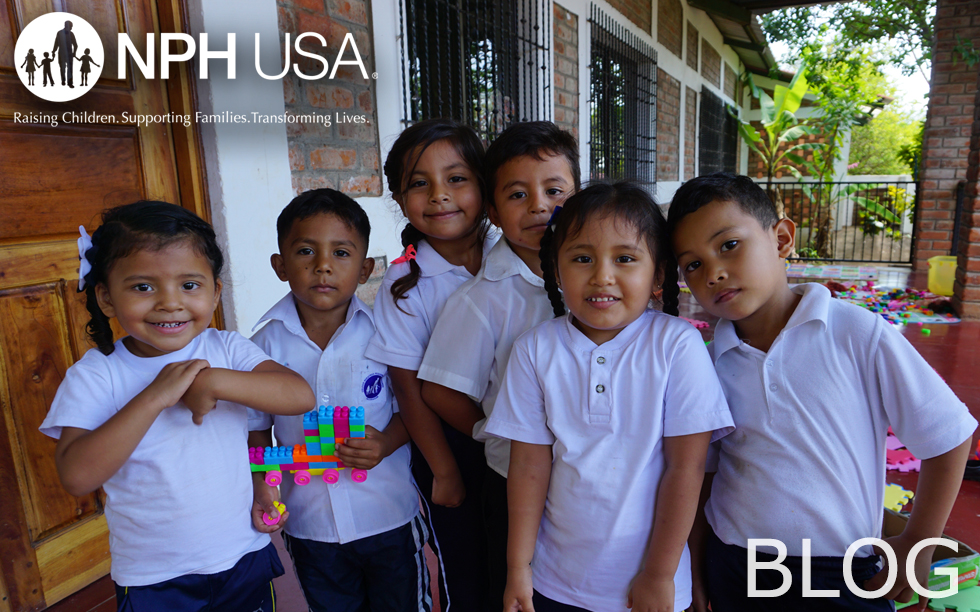Below is a beautiful
reflection written by Sue Bumagin, a NPH supporter, regarding her first trip to NPH
Honduras.
 My
husband, Paul, and I had been supporting a now-fourteen year old girl for three
years and we were finally going to meet her!
We chose to go the week
before Thanksgiving because there was to be a huge Quinceanera
celebration. On our first night, we watched some
celebrants busily prepare party decorations as we were shown the glittery and
strappy shoes that each had chosen for the festivities as well as an enormous
cake. Sadly, a boy who had been quite ill died the
day before all this was to occur so instead of celebrating, we went to a
funeral Mass attended by the entire community. Each child had an
opportunity to say good-bye by the open casket (face only) and many little ones
took it. While such a process helps to define death as a natural part of the
life cycle, these children have already known more than their share of sorrow
and loss.
My
husband, Paul, and I had been supporting a now-fourteen year old girl for three
years and we were finally going to meet her!
We chose to go the week
before Thanksgiving because there was to be a huge Quinceanera
celebration. On our first night, we watched some
celebrants busily prepare party decorations as we were shown the glittery and
strappy shoes that each had chosen for the festivities as well as an enormous
cake. Sadly, a boy who had been quite ill died the
day before all this was to occur so instead of celebrating, we went to a
funeral Mass attended by the entire community. Each child had an
opportunity to say good-bye by the open casket (face only) and many little ones
took it. While such a process helps to define death as a natural part of the
life cycle, these children have already known more than their share of sorrow
and loss. During our stay, there were big moments – like the funeral; and meeting our godchild and her delightful younger sister. Despite language differences, our goddaughter worked as hard to communicate with us as we did with her – and that’s saying a lot for a 14-year old! We had a good time baking together after which, she brought the cake back to her residence to share, saving one piece for her best friend and another for her sister – but not one for herself.
There were also many little moments that touched our hearts - like sitting in a big circle with the three to nine year-olds amazed that not a word was spoken while the children ate their lunch. They may have been taught to be quiet for the sake of minimizing chaos but the silence seemed almost reverential. Food is such a precious commodity. I exchanged a smile and eye contact with a young boy who had chosen to sit outside of the circle. After a brief conversation with our eyes, the boy moved in to sit next to me. It was such a sweet moment. Other lovely experiences included watching Paul swing a tiny girl who’d clearly wanted to be on the actual swing with the bigger kids but was too small to do so; or a boy proudly reading aloud to Paul from the English/Spanish storybook that we’d brought with us. These were lovely moments.
One
day, we accompanied the children to an event sponsored by Tom’s Shoes and UNICEF
at a military base about an hour away.
There we were joined by hundreds more children from all over the country
for a day of fun, food and most importantly, new shoes (Tom’s is an American
shoe company that donates a pair of shoes to someone in need for each pair sold
– support Tom’s!). When cotton candy was
distributed, a boy of around eight years old accidentally swiped past Paul,
leaving a yellow mark on his T-shirt.
Thinking nothing of it, Paul rubbed it off with some water. Hours later as the busses were loading,
Monica (who’d been trying to get the kids onto the bus) approached us with this
boy and his brother or friend in tow. He
was practically in tears. Refusing to
board, he kept saying that he had to apologize.
He thought that he’d ruined Paul’s T-shirt. I can’t describe the lump in my throat as I
thought about this boy worrying all afternoon and insisting on ‘making it
right.’ We told him that it was
‘absolutamente no problemo!’
In
the course of our brief stay, we experienced sadness; and joy (dancing with
Yami); the enjoyment of meeting volunteers from different parts of the world;
and the triumph of flipping all the tortillas in time at least once under Dona
Gloria’s watchful eyes. I have to
believe that such experiences - enhanced by about a thousand hugs - keep our
hearts more open to letting in the good and doing good.
Thank
you, NPH.





